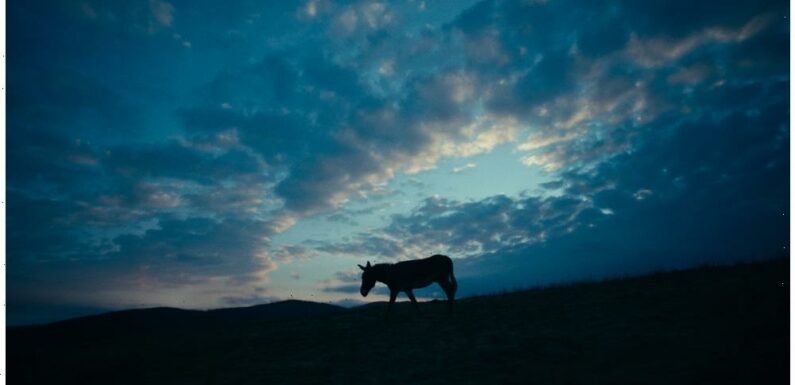
Speaking to Variety by Zoom from Warsaw, Polish director Jerzy Skolimowski – the director of Oscar contender “EO” – sits on his sofa with his dog Bufon, a German Shepherd, by his side.
Bufon, or “Buffon” as Skolimowski prefers to spell his name – as a tribute to the Italian soccer player Gianluigi Buffon – is an actor, having appeared in an early scene in “EO” as a “chained barking beast,” in Skolimowski’s words. It is the only time that Bufon has been secured by a chain. “He was very, very nervous about that,” Skolimowski says.
Skolimowski and Ewa Piaskowska – “EO’s” co-writer, producer (alongside Skolimowski), and Skolimowski’s wife – lived for many years in California, but then they came back to Poland, and moved to a 19th century hunting lodge deep in a wild forest. “We lived away from civilization, but enjoyed the full spectacle of nature once we left the house, with our dog on the leash, of course, because we kept meeting wild animals – deer, rabbits, foxes… and being in touch with nature somehow changed our attitude toward humans, I guess, or human nature,” Skolimowski says.

This was one reason why they thought that “maybe a human character as a leading one isn’t necessary” in a film. So, instead, they chose a donkey, the titular EO, as their protagonist, and we follow his journey from bliss to hell, along the way witnessing the stupidity and cruelty of humankind.
“EO” was inspired as well, in part, by Robert Bresson’s “Au hasard Balthazar,” which is the only film to have made Skolimowski cry, he says. That pic, too, follows the life of a donkey.
The third reason for making the film this way, he says, is that having worked together on three films – “Four Nights With Anna,” “Essential Killing” and “11 Minutes” – he and Piaskowska were eager to abandon classic cinematic conventions, and try something new.
He is full of admiration for the donkeys that play EO (there were several of them, sharing the role, for welfare reasons). “Some people say they are stupid, which is not right, because they are very sensitive, very intelligent animals, and also extremely humble,” he says. This rubbed off on him, he says, and changed his attitude toward those he worked with, such as cinematographer Michal Dymek, and composer Pawel Mykietyn. Whereas on previous films he had been quick to assert his status as the auteur, and was “very selfish,” on “EO,” he was humbler. “I made all possible efforts to be open to any suggestion from my collaborators,” he says.
The film is told from the donkey’s point of view and even the music helps do that. “My instruction to Pawel was: When you watch the film please hunt for the moments when you can get with your sound inside the head of the donkey, illustrating his inner monologue.”
This is what Mykietyn did perfectly, Skolimowski says. “Music made for a very successful replacement for the dialogue. It allows the audience to identify with the animal, and that was one of the most difficult tasks in that work.”
As previously mentioned, the donkey acts as a kind of witness to the vile behavior of humankind as he innocently observes various grotesque aspects of modern society. “We look at the humanbeings through the eyes of the animal, who is not judging or commenting. They have this very specific melancholic look, which could be interpreted in many different ways, because it doesn’t show anger or pleasure or any kind of reaction. It is ambiguous enough for the audience to put their own interpretation on how the animal looks at the humanbeings, and how he is judging them.”

On the other hand, “the human stories [in the film] are reduced to the minimum, because they are quite obvious,” he explains. “They are the illustration of the typical human emotions: Anger, love, jealousy and so on. And therefore, they were treated in a totally minimalistic manner – being reduced almost to vignettes. Then, elaborating on the meaning of those scenes, the whole emotional concentration was dedicated to the donkey.”
He adds: “It’s quite obvious that this film was made out of love for animals and love for nature. If I had been a pop singer, I could have call it a ‘protest song.’ It is definitely critical toward human behaviour toward animals. The protest would be against the extremes of the almost barbaric activity of the humans. Like industrial farming. We know the conditions of those animals. This is kind of macabre, and is still allowed in many countries, where I believe it should be outlawed for its cruelty toward animals.”
He says: “It makes me feel ashamed of the fact that, in a certain way, I am part of the system. Although, I must say that, subconsciously, while we were starting to work on the script, we kept reducing our meat consumption. We are not yet vegetarians, unfortunately, but we are a good way towards that stage. We have reduced our meat consumption by probably more than two thirds, and also I have to add the fact that while we were shooting the film, half of my crew stopped eating meat completely. So, I believe this effect may be spreading somehow among at least a part of the audience for ‘EO,’ and if that could be one of the effects of this film that would be the greatest reward and greatest achievement for making this film.”
Read More About:
Source: Read Full Article